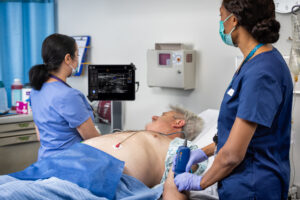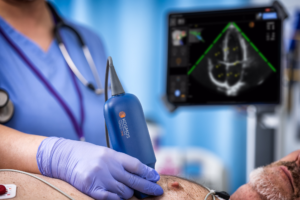Dr. Peter Fitzgerald

Professor (Research) of Medicine (Cardiovascular), Emeritus, Stanford University Medical School
Can POCUS Technology Put the Patient at the Center of Cardiovascular Care?
At EchoNous, we recently had the privilege of sitting down with Dr. Peter Fitzgerald, a leader at the intersection of technology and medicine. From his perspective as an engineer and physician, he believes wider adoption of POCUS could change cardiovascular patient care. Here’s how.
Meet Dr. Peter Fitzgerald
Dr. Peter Fitzgerald is the Director of the Center for Cardiovascular Technology and the Cardiovascular Core Analysis Laboratory at Stanford University Medical School. He is an interventional cardiologist, engineer, and Emeritus professor in Stanford’s Department of Medicine and Engineering.
Dr. Fitzgerald’s laboratory is home to 10 postdoctoral fellows and graduate engineering students, all focused on cutting-edge technologies in cardiovascular medicine. Over the course of his career, he’s led or participated in more than 195 clinical trials, authored over 650 manuscripts and chapters, and shared his expertise through lectures worldwide.
He’s also been instrumental in the medical device industry as a founder and advisor of more than 20 companies.
His commitment to advancing healthcare technology extends to his role as a co-founder of LVP Capital in 2001, focusing on medical device and biotechnology startups. In 2009, he co-founded TriVentures, an incubator and venture fund dedicated to early-stage medical technology in Tel Aviv and Palo Alto, CA.
Proactive, Patient-Centric Healthcare
Many patients don’t seek treatment for cardiovascular issues until they experience a heart-related event, which leaves providers scrambling to catch up. But more proactive methods for cardiovascular care are possible—and may involve the use of Point-of-Care Ultrasound (POCUS), according to Dr. Fitzgerald.
Imagine a healthcare system that looks beyond just treating symptoms and instead prioritizes taking preventive measures. Fitzgerald has a vision for seamlessly incorporating POCUS into our daily lives, making the early detection of potential health issues as simple as popping into the local grocery store. This patient-focused approach not only empowers individuals but also reshapes the way we view cardiovascular health, creating a more comprehensive and proactive model of care.
“People have anxiety about what their heart is doing,” he notes, emphasizing the importance of early detection. To address this, he envisions the integration of AI-guided heart scans at easily accessible locations like Walmart stores or local clinics. “Imagine having a heart-healthy scan readily available at places like Walmart, making it highly accessible not just to the urban areas, but also to the rural areas,” he suggests.
Drawing a parallel between the emotional impact of obstetric ultrasounds and the use of POCUS in cardiac care, he explains that, just as expectant parents become more health-conscious after seeing their baby’s ultrasound, POCUS can elevate cardiovascular health awareness.
“Once you see your heart on a screen or you take a picture of your heart, it’s your heart. It’s not an imputed thought process from a doctor, it’s actually your heart,” he notes. With a touch of humor, he adds, “Once you see your heart in action on that screen, you might start to eat a little more chicken without the skin on.”
Dr. Fitzgerald underscores the integration of heart health into daily life and the promotion of active participation in healthcare journeys. By prioritizing the proactive “bending of the curve” before health issues manifest, he advocates for a strategy that fosters healthy lifestyle choices and engages individuals right from the start.
Leveraging the early detection capabilities that POCUS offers, the goal is to empower individuals to take charge of their heart health before serious issues arise, thus laying the foundation for a healthier future and steering away from potential heart-related complications.
“Our healthcare system does a poor job at proactively reaching out into the population and addressing disease before it becomes a problem,” Fitzgerald admits. “Patients reach out to us, and that’s when we get involved, but often, by then, they have chest pain, they have heart failure, their hypertension is out of control, but the curve is bent. And now I have to help unbend it—or try to.”
He continued, “If we can get someone engaged earlier and make them and their family part of this awareness, that’s where we can have a huge impact.”
This is where consumer-focused organizations that are aiming to provide primary care services—Walmart, CVS, Amazon, and others—come in: where the healthcare system fails at proactively engaging the population, these organizations excel. With an AI-enabled ultrasound solution like Kosmos, that can help novice healthcare workers capture someone’s left ventricle ejection fraction, these prominent retailers can have a tremendous impact on detecting early-stage heart disease before a cardiac event occurs.
Fitzgerald believes in the transformative potential of early engagement and awareness, emphasizing the significance of proactive measures in establishing a more patient-centric and compassionate healthcare landscape. His vision involves equipping individuals with the tools and resources to actively participate in their cardiovascular care, empowering them to make informed decisions and take proactive steps toward improved heart health.
POCUS with AI for Earlier Disease Detection
If the vision of heart-healthy POCUS scanning in your local pharmacy or grocery store becomes reality, Fitzgerald believes it can make earlier disease detection and cardiovascular care more accessible than ever before.
He’s confident in this vision because he’s experienced the accessibility of POCUS firsthand.
“Picture this scenario: in my living room, my 21-year-old daughter conducted my echocardiogram using AI and the [Kosmos] POCUS device, which took just 9 minutes. Consider the revolutionary impact on diagnosis, potential management, and our perception of healthcare.”
Dr. Fitzgerald underscores the need to bridge the gap between clinical settings and patients’ lifestyles. He advocates for healthcare recommendations that are straightforward and attainable, such as incorporating a daily mile walk three times a week. Furthermore, he proposes enhancing dietary guidance by providing clear directions within a store, akin to a treasure map guiding shoppers to aisle 11.
In essence, his message underscores the significance of healthcare becoming integral to people’s daily routines, transcending the confines of clinical settings. This approach, he believes, holds the potential to significantly enhance the delivery of personalized and effective cardiovascular care.
At the same time, Dr. Fitzgerald recognizes the transformative influence of POCUS in fostering understanding and empathy among patients and their families. He underscores that it profoundly impacts families when they witness an echo, especially one equipped with Doppler capabilities capable of unveiling regurgitant jets. The visual representation is a powerful tool, demystifying medical conditions and dispelling individuals’ misconceptions or fears.
Revolutionizing Healthcare with POCUS
If POCUS has the potential to change the way patients view cardiovascular health, does the same apply to providers?
Dr. Fitzgerald thinks so.
In his view, POCUS stands out in the field of medical imaging. It’s more than just a tool; it’s a technology that is bringing the power of ultrasound to various healthcare settings, such as the bedside, the clinic, the ambulance, and even the field.
In fact, that shift is already happening. Highlighting a significant change he has seen recently in medical education, students increasingly favor POCUS over the traditional stethoscope. He even compares the two, likening the stethoscope “to Blockbuster and POCUS to Netflix.”
POCUS also plays a critical role in efficient patient triage. Dr. Fitzgerald appreciates the versatility of a POCUS system like the Kosmos, with its open APIs and Doppler capabilities, which enables detailed assessments. Tools like these can help providers identify specific cardiac issues during outpatient visits. As he notes, “I just need that tip of that iceberg to be able to triage effectively and efficiently those that might have undetected heart disease.”
This hasn’t always been the case. Reflecting on his experience as a young cardiologist at Stanford, Fitzgerald notes missed opportunities for early intervention in cases of mitral regurgitation. He emphasizes the importance of timely diagnosis and treatment, noting that a combination of early recognition through POCUS and the use of catheter-based methods can “significantly improve longevity and quality of life when applied early.”
His perspective on POCUS also focuses on its potential impact on healthcare accessibility, particularly in underserved regions. In his ideal future, POCUS, guided by AI assistance, is pivotal in diagnostics and medical training.
Furthermore, he strongly emphasizes the importance of including tutorials and training within POCUS devices to support those learning to use this technology for the first time. He believes that POCUS could serve as a vital diagnostic tool, especially in regions with limited access to healthcare resources, noting, “This might be their only available diagnostic tool in [certain] countries or areas” with limited healthcare infrastructure.
This can have an impact on communities closer to home, also. Healthcare disparities, especially in regions with a high prevalence of diabetes and heart disease, contribute to reduced life expectancy in rural and underserved communities, even within the United States. He believes that better coordination between diagnostics and therapy, facilitated by POCUS, could be a significant step toward addressing these inequalities.
POCUS has the potential to make healthcare proactive, accessible, and empathetic by empowering individuals to take charge of their cardiovascular health. It demystifies medical conditions, encourages healthier choices, and fosters early intervention. As we embrace this technology-driven era, POCUS is a powerful tool that revolutionizes diagnostics, reduces disparities in healthcare, and enhances patient outcomes. Dr. Fitzgerald’s journey inspires us to embrace POCUS as a tool to make healthcare more patient-centric and compassionate.



